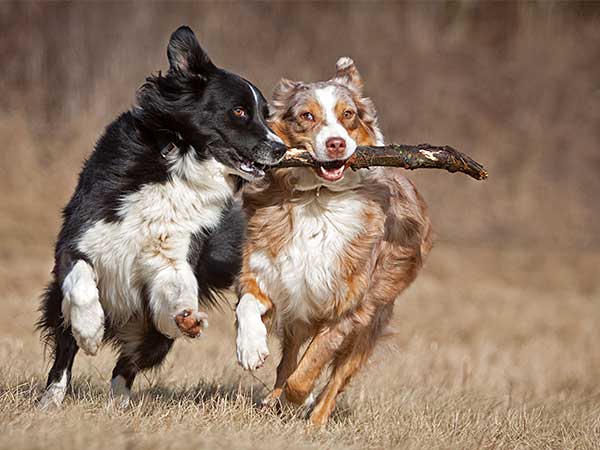
Dog Chewing Paws? What You Need To Know
A dog chewing paws is actually quite common and could have any number of causes. While it shouldn't be cause for panic, you do want to pay attention if your dog chews his paws often as it may be a sign of an underlying physical problem and you may want to take him to a vet just to be careful. In any case, it is bothersome but it is a behavior that can be corrected with the right approach.
One of the most common causes of paw chewing is a skin allergy. Like humans, dogs are susceptible to contact dermatitis and chewing could be a reaction to itching and irritation caused by seasonal allergens, dust, pollen, mold or a reaction to a household chemical. Because a dog can't tell you when he's itching, the first indication you might have is if he begins gnawing on his paws.
Another major culprit in terms of a dog chewing paws is dry skin. Again, this can be just as much of an issue for dogs as it is for us humans. Dry skin can be caused by the same conditions that affect humans, including changes in climate, cold winter air or lack of humidity. Also, your dog may not be getting enough fatty acids in his diet, which help to keep the skin moisturized. Itchy, dry skin may make him bite his paws but unfortunately biting may only serve to exacerbate the problem, causing chapping.

Mathias Ahrens / stock.adobe.com
Australian Shepherds work hard and play hard and their paws can take a beating coming in contact with many things that can irritate or injure them.
Other physical causes of paw chewing can include pain and infestation by parasites such as ticks and fleas. Sometimes, a dog will chew an area that hurts as a way of trying to stop the pain. Ticks, fleas and mites can all cause itching, which can in turn lead to paw chewing. If your dog spends a lot of time outside, it is always wise to check him thoroughly for ticks. Fleas and mites are much smaller and harder to see so you may have to have a vet make a diagnosis in those cases.
Because a dog's paws regularly come in contact with any number of rough, overgrown or potentially damaging surfaces, it is very easy for them to become injured. Glass, thorns, rocks and other objects can become embedded in the delicate pads causing a great deal of pain. A dog chewing paws may be reacting to that pain so you should always check his paws to make sure there is nothing in them or no injury to them.
Other Causes For A Dog Chewing Paws
Aside from the physical causes, paw chewing can also be caused by anxiety, depression or simple boredom. This can be particularly true for high energy breeds like the Australian Shepherd, which are prone to this kind of reaction. If Aussie's don't get enough exercise, they can expend their excess energy by obsessively nibbling at their paws. If this is the case for your dog, try to find something else to distract him from chewing his paws and make sure he is getting out and moving enough.
If you're dealing with a dog chewing paws, first and foremost you want to rule out any physical issues. If there is a physical cause, then address it by treating the condition. If the cause is emotional then try to help your dog work out his excess energy and find a less harmful way of expressing his anxiety. With the right approach, you'll be able to break your dog of this habit in no time.
Have Dog Training Questions?
Check out these introductory dog training videos...
I want my dog to stop being aggressive.
I want some help training my new puppy.
I want my dog to stop barking at everything.
Get Australian Shepherd Info, Website Updates, Special Offers, and Cartoons...
FREE GIFT
You'll also receive a free copy of the ebook
My Everyday Dog Training Tools
by professional dog trainer Daniel Abdelnoor, "Doggy Dan"










 Loading Image...
Loading Image...